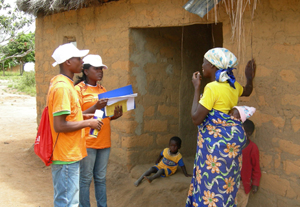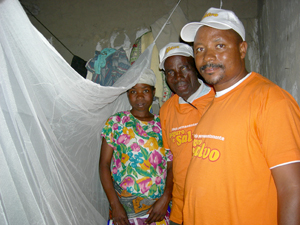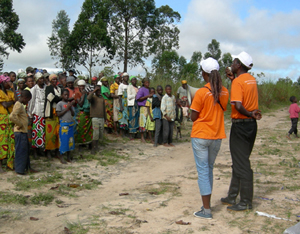
Dressed in orange T-shirts that advocate the use of ITNs, community volunteers conduct a door-to-door registration to determine the number of nets and people in each home and distribute vouchers for new nets. Source: PSI
With support from the President’s Malaria Initiative, ExxonMobil, and the Global Fund to Fight AIDS, Tuberculosis and Malaria, Population Services International (PSI) is working with the National Malaria Control Program to increase the availability of long-lasting insecticide-treated nets (ITNs) to populations not reached by free nets and increase net use.
Malaria is one of the largest causes of morbidity and mortality in Angola and is common in all provinces. Pregnant women and children under 5 years of age are particularly vulnerable. The Government of Angola provides free nets to these high-risk groups through routine care in health centers.
With support from the President’s Malaria Initiative, ExxonMobil, and the Global Fund to Fight AIDS, Tuberculosis and Malaria, Population Services International (PSI) is working with the National Malaria Control Program to increase the availability of long-lasting insecticide-treated nets (ITNs) to populations not reached by free nets and increase net use. ITNs are a very effective way to reduce the risk of malaria, particularly if 80 percent of members of a community are sleeping under a net. With this in mind, in April of 2010, PSI distributed 120,000 nets free of charge during a campaign in two rural municipalities in Bie Province.
Working with community volunteers from the American Red Cross and the government health system, PSI organized door-to-door registration in these rural communities to determine the exact number of nets needed to reach universal coverage based on population size and the existing number of nets in each house.
Each house received vouchers for the appropriate number of nets to receive, and the nets could be picked up from a central location. During distribution, volunteers educated each person about malaria transmission and prevention, emphasized the importance of always using a net, and encouraged community members to get tested immediately when symptoms appear and get rapid treatment when malaria is confirmed.
Distribution of nets was followed up by a campaign by volunteers to help hang the nets in houses. A recent study indicated one of the reasons mothers do not use a net for their children is because they do not know how to hang it up. Thus, this follow-up activity provides a better chance that people will actually use the nets.

Volunteers followed up the net distribution by visiting each home to ensure nets are hung up properly. Source: PSI
These activities were well accepted by the provincial and municipal government entities, the community leaders, and particularly the community members. Despite many barriers to malaria prevention, and even though this small number of nets will not address all the country’s needs for reaching universal coverage, these two municipalities are now closer to being malaria free.

